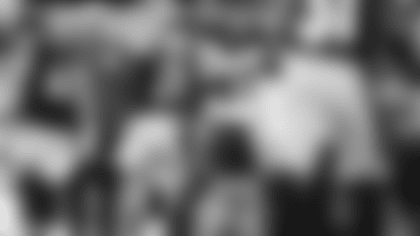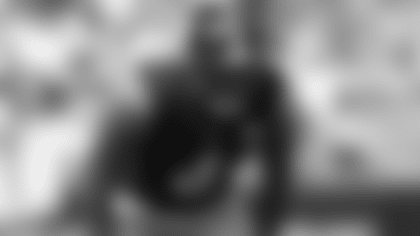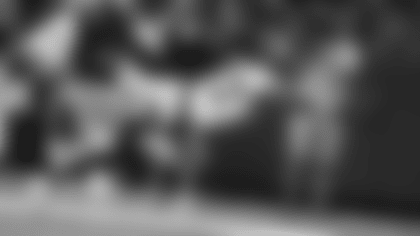Q. In the recent past, you have had assistants on your staff who had previous experience as a head coach. Mike Munchak and Brian Flores are a couple of examples, and now Arthur Smith fits that description as well. Guys who have previous head coaching experience, what qualities do they bring that are unique to other assistants?
A. They have a global set of eyes based on their experience. They can step outside the roles that they hold and see the big picture. They're useful in things outside of their designated jobs, such as in calendar creation and things of that nature. There's just experience that is useful and helpful to me in terms of some of the things that I have to do. They're a good sounding board, or an ear for me. It has been a good experience for me to have that, and I am excited about the experience that Arthur brings in that area. More than anything, it's a good resource and useful for me as I do some of the background-like things, some structural things that kind of come with the job. I'm able to delegate some of those things, too, and lighten my load. That frees me up to do more coaching when I've got a guy with that type of experience and I can give some assignments to him. It's always helpful to me. I'm always really excited about it. More than anything. I just like the perspective that they bring.
Q. Do you think Arthur Smith's play-calling might be different or impacted a little bit by his experience as a head coach, as opposed to an offensive coordinator who has never had that job?
A. No question. And those are probably his sentiments that I've gotten from him throughout this process. I think that when you've been a head coach, it forever changes you in a lot of ways as it pertains to ball and coaching. And so I think it does help you evolve as a play-caller or offensive coordinator, and so I know he's excited and refreshed and really eager to get started with this season.
Q. Chuck Noll always said that "playing football is not normal human behavior." And by that he meant that the skills required for blocking and tackling, the love for the physical contact that's critical to doing those things well, have to be taught and re-taught and players have to learn and re-learn. Would you agree?
A. I agree wholeheartedly. I think the men who play this game have a certain appetite for the violence that's a component of this game. You've got to hone that appetite and develop those skills into functional things that allow them to perform and for us to pursue victory.
Q. In some way is that why your training camps are physical and contain tackling and a lot of competitive periods?
A. Without question. It is my job to ready them for the fights that await. I believe it's difficult to box without sparring, but also we're in an environment where we're trying to go from 90 to 53, and so these guys want to put their skills on display. The less speculation that we have, the clearer the evaluation process. When you tackle, you're not speculating how plays come to an end. You're not speculating about skill-sets that are really relative to the game, which include the ability to tackle consistently, the ability to break tackles. And so it's very necessary, from my perspective, if you're interested in No. 1, readying the group for the battles that lie ahead, and No. 2 giving everyone a legitimate, fair evaluation process where they can also grow.
Q. On the flip side, you're also known for giving veteran guys time off, for dialing things back, for the potential of bounce-back days. Do you have a formula for when to do those things, or is it a gut feeling?
A. It's somewhat of a formula and somewhat of a gut feeling. You know, guys with "first-team All Pro" on their resumes, for example, I give them what they need to be ready for the season, and nothing more. And so you think about guys like Cam Heyward and T.J. Watt and Minkah Fitzpatrick, for example, also Miles Killebrew on special teams – what can Killebrew show me out on the practice fields in Latrobe as a special teamer that he hadn't already showed me. So I minimize him. I want to see others. I minimize those first-team All-Pro guys. I want to give those guys enough to be ready for the regular season opener, while at the same time not leaving any of their games on these fields in Latrobe.
Q. You once were a young assistant coach, eager and enthusiastic, and you have described yourself as someone who could be a pain to the head coach with constant suggestions and ideas. When you have a young assistant coach on your staff who's like you were, how do you handle that?
A. I show them the grace and patience that guys like Tony Dungy showed me, because I recognize what makes people a bad follower at times: It's leadership aptitude and skills. And why would I squash that? It's my job to cultivate that, to help them grow, to teach them how to infuse their personalities appropriately. I've got no desire to squash that, because I can relate to that, and I am thankful that I worked for men who were patient with me in that regard, specifically Tony Dungy and Jon Gruden.
Q. So you have a level of tolerance, would you say, or you can get pushed to a certain degree but then no more?
A. I have a level of tolerance, but I also have a line. (Laughs)
Q. You always say, "One man's misfortune is another man's opportunity." Russell Wilson's calf injury created an opportunity for Justin Fields. But did it also create an opportunity for you and your staff to learn about a new player at an accelerated rate?
A. No question, and not only knowledge of Justin but also knowledge of Kyle Allen as well. And so sometimes one man's misfortune means opportunity for others, plural. Justin obviously had an opportunity to get more reps, and for us get to know him. And I can say the same thing about Kyle Allen.
Q. What did you learn?
A. I think exposure is everything. I'm more familiar with their skill-sets, their talents, the things that they do well and naturally. Exposure is good, and so it's been an increased exposure, an accelerated understanding, the knowledge of who they are as players.
Q. What are you looking for from your team in tonight's preseason opener?
A. A high floor from a fundamental perspective. Before you can start kicking butt, you gotta not kick your own butt. And I just think that's a component of this process. I don't want us to be highly penalized. I want us to have cleanliness on both sides of the ball pre-snap. I want us to do routine things routinely. Those are some of the things that I want to see the first time out. As opposed to the spectacular, I want to see some high floor things.
Q. Because the Texans played in the Hall of Fame Game, will they be in a different place than your group, which has not been in a stadium yet?
A. No question, but that's a good thing for us. You know, it changes you once you step into a stadium in terms of development. And so they are further along in their process than we are. Because of their participation in the Hall of Fame Game, they were in training camp essentially a week before we were. At this stage of the journey, that is a significant advantage from a developmental perspective, and so I'm excited about that. I like challenges. We need challenges. It's good to be in a stadium with a team that's further along than we are. We'll adapt, and it'll help us evolve. We're going to get some of their frontline players, for example. And so there's a lot about it that's attractive, from my perspective, if you're talking about our development and the things that we get to see.
Q. With regard to the new kickoff rule, are you more likely to be aggressive and proactive with your team and your decisions, or might you use this first preseason game for recon, for trying to get a handle on how opponents might approach it?
A. More than anything, I'm not trying to get too much accomplished. We're going to hit it right down the fairway, if you will. This is our first exposure to it. I want to make sure first that the guys understand the play, the rules of the play, the things that are significant in terms of the design of the play. Those are the things that really have my attention. Less about strategy, what we intend to do as we move into the fall, or what the Joneses are up to, we just want to dip our toe in the water initially.
Q. If there had been no change to the kickoff rule, would there have been a joint practice with Buffalo?
A. Yes. I'm into joint practices, particularly when I have a relationship with the coach. I think you like the intensity of it, while at the same time you want to maintain professionalism. I think relationships aid in that. The history that Sean McDermott and I have make us appropriate dance partners, and I'm glad that it's going to happen for us.
Q. Besides what you just mentioned, what are the plusses and minuses of a joint practice?
A. For example, Buffalo is a 4-3 team on defense. We're a 3-4 team on defense, and so during the course of the season, you see some 3-4 teams, and you see some 4-3 teams. Our offense has almost seen exclusively a 3-4 structure in training camp. It's good for them to work during development against something that's schematically different. We utilize a bunch of tight ends and so forth offensively; Buffalo has been a three-receiver group, if you will. And so it's good for our defense, maybe to see some different things offensively; it's good for our offense to see some different things defensively. It's just all part of the developmental process.
Q. You mentioned the relationship you have with Buffalo Coach Sean McDermott. How does that relationship maybe prevent some of the potential negatives of a joint practice?
A. You know, that's my brother. We've been friends since we were young, young people. So it's because of the depth of that relationship that it's probably easier to maintain the professional environment that we all desire.
Q. When it comes to playing time in preseason games, do young guys have to earn playing time through how they perform in practices, or do you view these preseason games as just another part of the evaluation process?
A. It's another part of the evaluation process. But make no mistake, the participation is earned. We're going to use everybody. You've got to use everybody. But WHEN they participate in-game is the thing that is earned in this process leading up to it. And the sooner you get in these games, obviously, the better shape you're in in terms of being a component of this.














